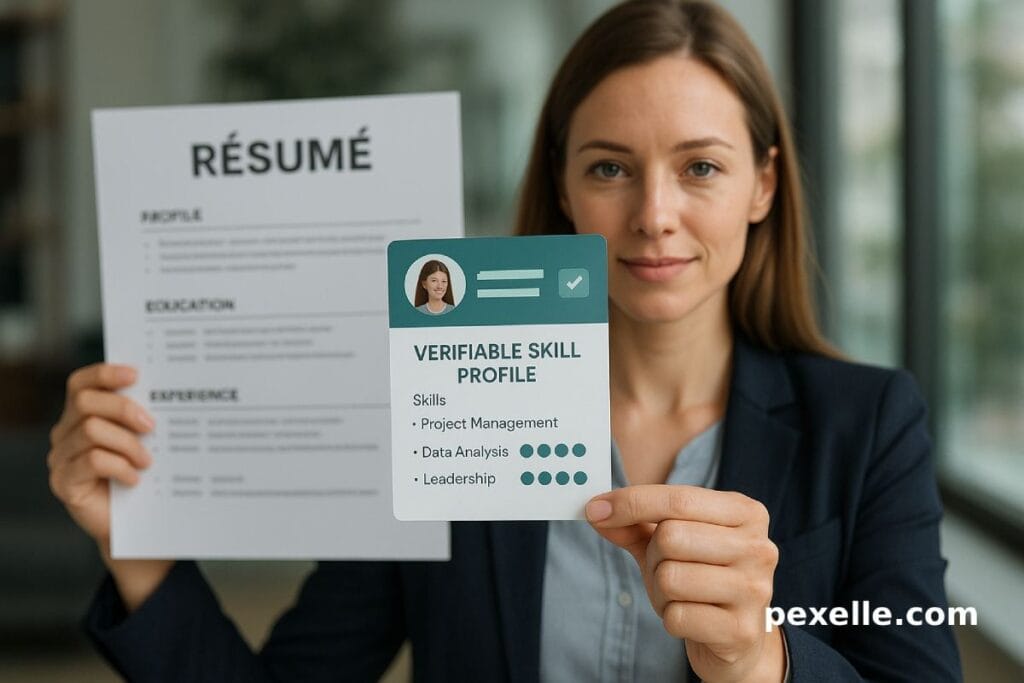From Résumés to Verifiable Skill Profiles: The New Currency of Trust in Hiring

For decades, the traditional résumé has been the central document of every hiring process. A single sheet of paper was supposed to tell employers everything they needed to know — education, job titles, years of experience.
But in 2025, this model is cracking under real-world pressure. As technology reshapes industries and skill demands shift at lightning speed, résumés are losing their power. What’s replacing them is smarter, more transparent, and far more valuable:
👉 verifiable skill profiles — living records of what a person can actually do, backed by proof.
🧭 Why Résumés Are Losing Their Relevance
Résumés were designed for a world where:
- Jobs were stable and long-term.
- Education was centralized in universities.
- Employers trusted titles and degrees as indicators of skill.
But the modern workforce doesn’t work that way anymore.
- Skills evolve faster than job titles.
By the time a job title is printed on a résumé, the actual tools and technologies may have already changed. - Degrees are no longer the gold standard.
According to World Economic Forum, 44% of companies in 2025 prioritize skills over formal education. - Résumés are not verifiable.
Employers can’t easily validate whether someone truly has the skills they claim.
This creates a dangerous gap between what candidates say and what companies need.
🧠 What Verifiable Skill Profiles Are — and Why They Work
Unlike a résumé, a verifiable skill profile is a living, data-driven identity.
It doesn’t just list skills — it proves them.
A modern skill profile typically includes:
- ✅ Skill badges earned through certified learning platforms (e.g., Coursera, edX).
- 📁 Project evidence — real work linked to each skill (e.g., code, design, reports, publications).
- 🧾 Blockchain or system-backed verification, ensuring authenticity.
- 🔄 Continuous updates as the person learns and grows.
This gives employers what résumés can’t: trust.
They don’t have to guess whether someone actually knows Python, project management, or data visualization — they can see proof.
🔐 The Power of Verification Technologies
The transition from résumés to skill profiles is being accelerated by technologies that make credential verification simple and secure:
- 🧾 Blockchain-based certificates: Prevent fraud and allow cross-border trust.
- 🤝 Decentralized identity systems: Let individuals control their own verified records.
- ⚡ AI-powered matching: Companies use AI to instantly find candidates whose proven skills fit a job role.
Instead of a stack of résumés, recruiters can now filter verified skills in seconds — increasing both accuracy and speed.
🌍 What This Shift Means for Job Seekers
This revolution flips the hiring power dynamic.
Candidates no longer have to “look impressive on paper.” They just have to show what they can do.
Here’s what gives job seekers a strong edge in 2025:
- 📚 Earning recognized skill credentials from trusted platforms.
- 💼 Building a living portfolio with proof attached to each skill.
- 🪙 Using blockchain or verifiable systems to make their profile trusted at a glance.
- 🔁 Regularly updating their profile as they learn and grow.
The more transparent and verifiable your skills, the less you rely on “buzzwords” to sell yourself.
🚀 Why Companies Love Skill Profiles
For employers, this shift is a gift:
- 💡 Faster, more precise hiring decisions.
- 🧭 Less reliance on gut feeling — more on real evidence.
- 🔒 Lower risk of hiring underqualified candidates.
- 🌐 Global reach — skill proofs don’t have national borders.
This approach is especially powerful for startups and fast-moving industries where speed and trust matter more than formalities.
🪄 Final Thought
The résumé isn’t dead, but it’s being replaced by something smarter.
Verifiable skill profiles are not just documents — they’re dynamic identities that grow with the person.
🎯 “Skills are the new degrees. Proof is the new résumé.”
In a world where trust and speed define success, verifiable skills are the new currency of work.
And platforms that enable this — like Pexelle — are not following the future.
They’re helping build it.
Source : Medium.com




